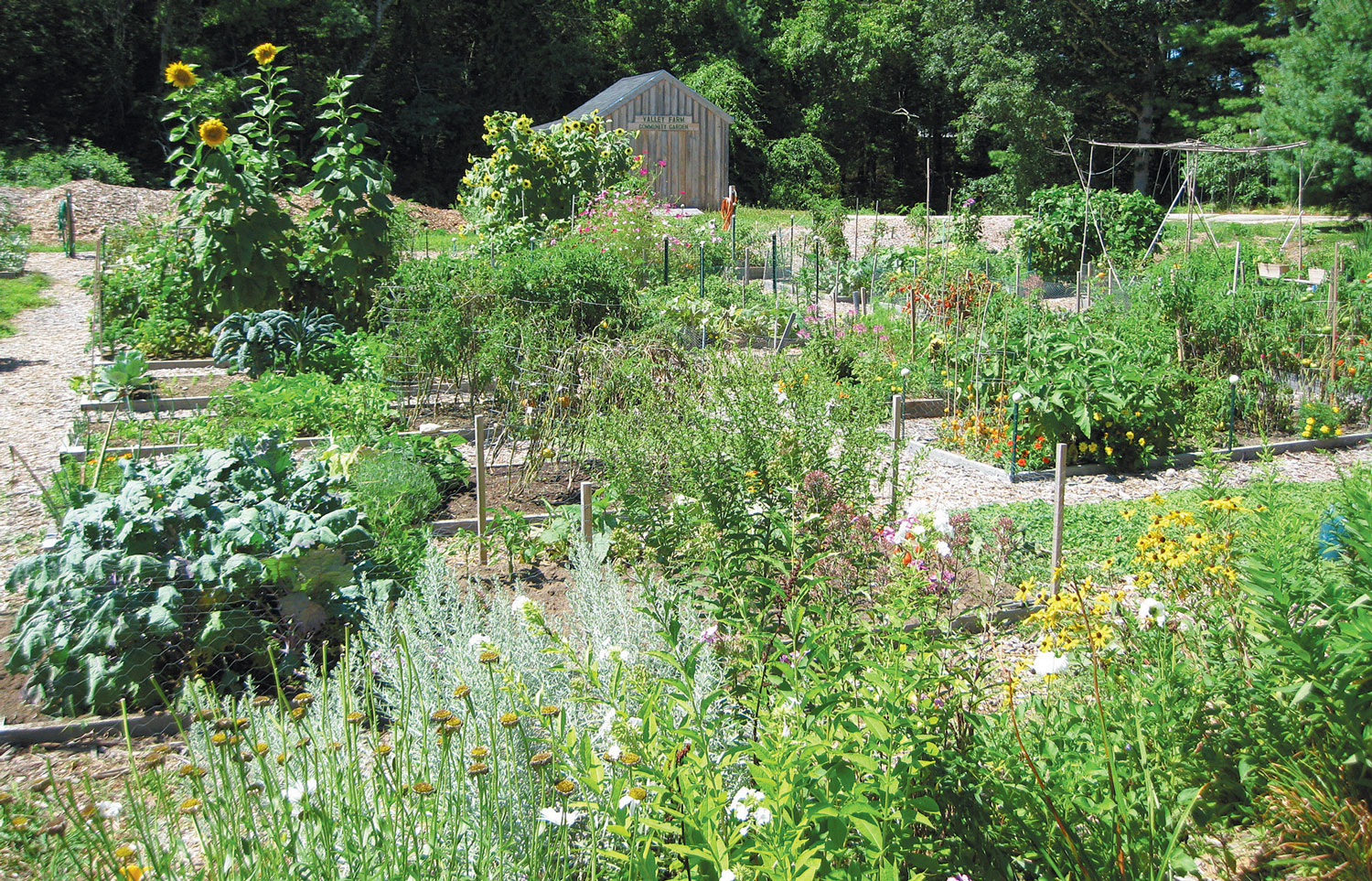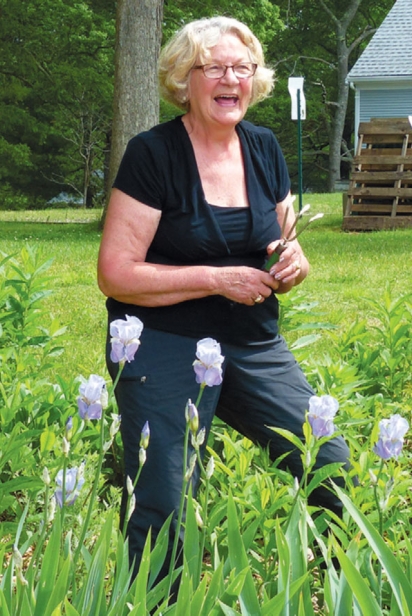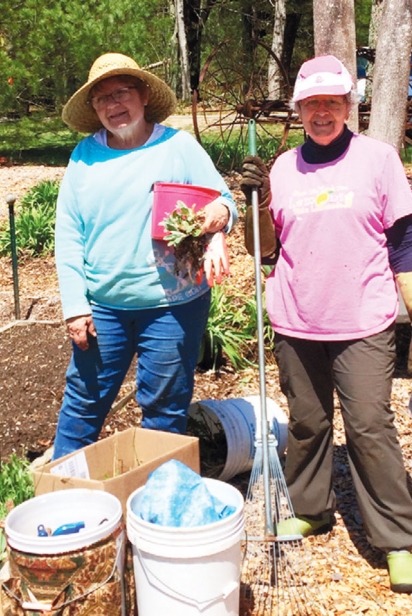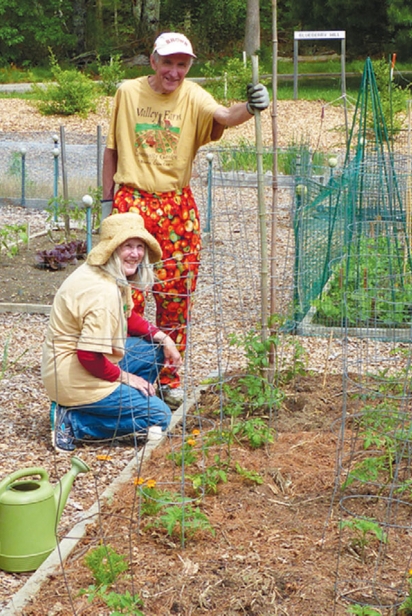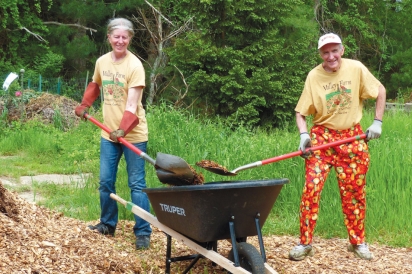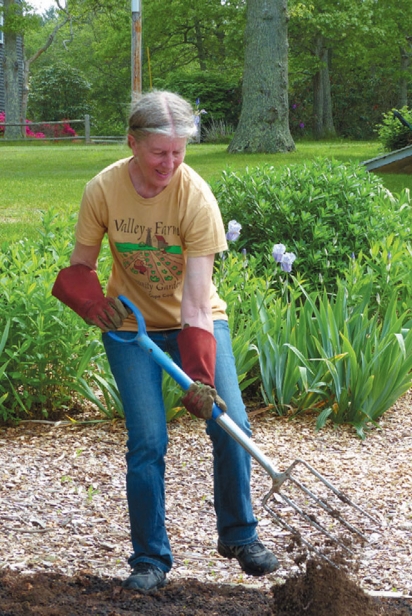New Age Victory Gardens
County Road winds through Bourne in the bright April sun. Salt rides a cool breeze, birds venture forth, and trees consider budding as we pull into a beehive of Saturday activity at the Valley Farm Community Garden.
Diane Speers greets me on the three acres of historic farmland located on the old Barnstable County Hospital campus. We shake hands and she explains, “We have re-purposed historic farmland into New Age victory gardens.”
We are witnessing the very beginning of the garden’s seventh season. Valley Farm Community Garden began in May 2012 with 21 plots. It is currently the only community garden in Bourne, and now contains 97 plots tended by a multi-generational assortment of families and friends of all ages and gardening abilities.
An old farmhouse sits between the road and the garden. Historically this was the home of Allen and Rachel MacLeod, who tended the land to feed the patients of the Barnstable County Hospital from 1919 to 1945. MacLeod’s purview included the kitchen farm, poultry and pig yards, with the icehouse near Flax Pond.
The hospital opened after World War I to treat tuberculosis patients and offered a variety of medical care through subsequent years. In 1925 a children’s camp was opened on the site, with the intent to foster continued health in young people through fresh air, healthy food and rest. In 1927-1928, a sanitarium was added, and every summer a clinic was held for children’s tonsillectomies. By the 1950s the hospital was treating polio, and continued to serve the community with its outpatient program through the 1960s and 1970s. In 1972 an alcoholic and rehabilitation program began as the hospital changed its focus to rehabilitation until shifts in the way medical care was financed led to its closure in 1999.
Today the farmhouse contains the Valley Farm Thrift Shop, which benefits three Bourne non-profits: the Bourne Historical Society Aptucxet Trading Post; the Bourne Society for Historic Preservation Briggs McDermott House Campus; and the Cataumet Schoolhouse Preservation Group; all of which collaborated to create the thrift shop ten years ago. The shop is filled with a treasure trove of china, glass and vintage styles.
It was the view of the land from the thrift shop that led to the concept of the garden, and Speers credits volunteer Don Duberger with the original vision. “He saw the land, and he saw the potential for a community garden after the thrift shop started,” she said. Ben Joyce was also part of the original project vision from brush to garden, and recalls “endless bittersweet and invasive plants as thick as can be” covering the land.
Community Garden members agree that the garden’s success is rooted in a community effort. The land itself is leased from Barnstable County, and it took a year and a half to clear the site and return it to a field. “It takes a village. We were fortunate we had landscapers, cranberry bog owners, and other people who helped along the way,” Speers said.
Of the 97 plots now in place, four are farmed by the Bourne Food Pantry, providing for 350 families a month. Tomatoes, string beans, cucumbers, squash and peppers; the four plots ensure over 700 people, 23% of whom are seniors, receive a supply of diverse, fresh produce which would otherwise be very expensive.
Karalee Packard of Pocasset is preparing a raised plot with her friend Alda Barron, also of Pocasset. Packard has been gardening here from the start and is currently on the Community Gardening Advisory Board. Both women are growing vegetables and herbs. Packard refers to the flow of community effort, saying, “we give it and we get it.” She tells me she was the originator of the food pantry garden, which she started as a Girl Scout project. “I’m here because I love the idea of community gardens, and I always dreamed that Bourne would have one. I heard about it and said, that’s for me!” Barron laughs. “It all started from a pile of bittersweet and poison ivy,” she tells me.
Speers describes a very volunteer-based organization. “We build the raised beds, and we built the barn ourselves. This is a sweat-equity project. The tree service guys donate the wood chips, and we spread them ourselves on the garden paths,” she said.
Members of the community garden represent every village in Bourne. Some are also members of the Aptucxet Garden Club. Some live in condos and want to keep gardening, some have shady yards, and some like the idea of gardening with others. It’s a social atmosphere, with several meetings a year, a summer cookout, and a fall potluck dinner. The garden marks the Fourth of July, hosts a pumpkin patch of their own pumpkins in October, and will participate in this year’s Cape Cod Hydrangea Festival in July.
“It’s a huge social aspect, and it has a life of its own,” said Mike Ryan of Pocasset. He is on the garden’s steering committee and says the experience has made him a gardener.
We have timed our visit well because the gardeners are gathering before the barn for a cookout lunch. I am offered a hot dog, a chair, and a glimpse of the garden’s social life. It’s a welcoming, chatty crowd, and Karalee Packard talks about how the gardeners pitch in to help each other. There is a stand of blueberries to the left and a pumpkin patch far off to the right. Two perennial gardens lay beyond the plots, which are just awakening in the spring light, soaking in the sun before us. George Slade, a Bourne Selectmen, notes the cross-section of members and the social aspects. Speers concurs, “Learning from each other is a huge part of it, we share tips, techniques and plants, and we meet new people from a broad demographic.”
Ryan tells me he keeps the club’s checkbook, and Speers mentions the challenges of becoming self-sustaining. “It’s a low budget operation. We have help with labor and materials, and a broad base of community support which is very impressive.” Ryan mentions the club’s income from donated turkey manure sales and raised bed plot rental fees.
It is a contented crowd of gardeners, and they’re happy to give back. In addition to the food pantry plots, the club provides a scholarship to the Upper Cape Technical Institute in support of its horticulture and environmental science program.
Speers, hot dog still in hand, leads us past the raised beds and a flowering fruit tree from a forgotten orchard, to a group of Mason bees inhabiting an intentionally elevated post. The bees do not require a hive and live on the post in a high-mounted box-like structure. She says they are good pollinators and less aggressive than regular bees.
I think back to Speers’ concept of the Valley Farm Community, “in the sense of our gardeners, and in the broader sense the involvement of the neighborhood.” We watch the bees busy activity around the post and they seem to be working in the quiet contentment of their own buzzing community. They seem a lot like today's community garden members.
The Valley Farm Community Garden is open to all Bourne residents by application. At this time the garden is fully subscribed, and a wait list is available. Members pay a fee for their raised bed plots of $10 to $20 depending on size, and receive a raised garden frame filled with soil, access to water from the member-installed irrigation system, the barn, tools, and the wisdom and society of other members.


